|
|
Welcome to my travel log! You will find here a lot more than in the travel reports, stripped from political correctness. Enjoy! 
Nov 19, 2005 07:00 PM Gisenyi to Kibuye (Rwanda)
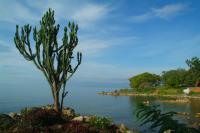 After I came back to the hotel to check out, I negotiated with couple of taxi drivers to take me to Kibuye. Obviously they wanted to rip me off, so I had to bargain hard. I eventually agreed to pay USD 70 for an exhausting 4.5 hours bumpy ride. I do not know why exactly, but I thought that the ride should take something like three hours. Maybe it would have been three hours by an off-road car. I was travelling by a regular Toyota Corolla.
After I came back to the hotel to check out, I negotiated with couple of taxi drivers to take me to Kibuye. Obviously they wanted to rip me off, so I had to bargain hard. I eventually agreed to pay USD 70 for an exhausting 4.5 hours bumpy ride. I do not know why exactly, but I thought that the ride should take something like three hours. Maybe it would have been three hours by an off-road car. I was travelling by a regular Toyota Corolla.
The dated Toyota was struggling along a challenging rocky road and finally overheated. Twice! The guy had to stop and look for water. I would have thought he would be prepared for such situation and carried water with him. Fortunately, there was plenty of water everywhere and local kids were happy to oblige for few Rwandan francs.
Anyway, I was glad I took a taxi. I had enough of minibus rides for a while.
Well, the route was very scenic. First, it passed between and above incredibly green and vast tea plantations. Then, it offered spectacular views of Lake Kivu and the Congolese mountains on its other side.
The car passed through several small villages and two larger ones. I was a little surprised, as did not see them on the map. I thought they looked very civilised with houses made of bricks rather than reed or bamboo cane.
|
Nov 19, 2005 07:00 PM Lake Kivu at Gisenyi (Rwanda)
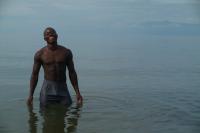 In the morning, I went to explore the town a little more. Obviously, I went down to the lake again to see how the resort looked like in the daylight.
In the morning, I went to explore the town a little more. Obviously, I went down to the lake again to see how the resort looked like in the daylight.
The lake and the beaches were great. I took a few good pictures there. Also, completely unknowingly, I was photographing the border with Zaïre but no-one stopped me. I only found out later from one of the beaches in Gisenyi that I was aiming my camera towards the Congolese border town of Goma. Taking pictures of the border was a categorical no-no.
My camera was loosely bumping against my stomach and I found that this actually made local youth come forward and ask for their pictures to be taken. I noted this phenomenon before in Zimbabwe and Malwi, so I decided to show off my camera a little whenever it was reasonably safe to do so. This way I could increase my collection of people’s portraits.
Naturally, a few local guys appeared and they wanted to have a conversation with me as I moved from one beach to another. Their motives ranged from begging, looking for a sponsor, a pen-friend or just a person, with whom they could practice their English. One of them, Faustin, spoke quite good English indeed, the was simply looking for someone to talk to in English and perhaps a pen-friend as well.
He actually wanted to go with me to Kibuye later that day. He had holidays whilst waiting for results of his school exams. I cannot remember now why he eventually did not go.
As we were talking by the lake, a young athletic guy kept trying to be noticed, jumping to the lake and flexing his muscles. It was dead obvious he wanted his picture taken. He stared at me and my camera, so I after an hour, I asked him if he wanted to be photographed. It was very funny to see him so happy and at the same time so unsure which pose to choose. It turned out that he was quite shy or perhaps he did not understand much English. His name was Pascal. I took a few shots of him in the lake and said that I would try to send the pictures to Faustin.
I made sure it did not sound like a promise but he nevertheless shook my hand in all possible African and unidentified hybrid ways.
I actually noticed that people of Rwanda, and to a lesser extent Uganda, shook hands while putting their left palm on their right forearm. In a very similar way they would collect items when these were handed to them. It denoted respect.
|
Nov 18, 2005 07:00 PM Gisenyi (Rwanda)
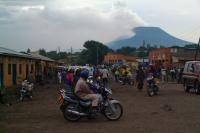 I was staying at the somewhat uglier upper part of the town. When I came down to the lake, I was surprised how attractive the waterfront was.
I was staying at the somewhat uglier upper part of the town. When I came down to the lake, I was surprised how attractive the waterfront was.
The beaches and palm tree planted avenues complete with grand villas made a great picture of a resort.
I came to the lake in a search of a restaurant that would serve fish. One would expect this should be relatively easy in a resort town at the lake. Yet the Auberge de Gisenyi, where I was staying, did not serve fish. Well, I have to say that I was impressed with the buffet they were offering there, however.
Anyway, I found a great hotel right at the lake and without much hesitation stepped in. It was the Kivu Sun Hotel with a bar and restaurant by the pool and a great sunset lake view. They had fish and I was happy. So happy that I decided to break the rule and ordered dessert - Iced Mango Sufflé. It was perfect and I only wished that I could admire a sunset instead of African growl-less lightnings of distant thunders flashing frequently over the lake.
Uh, I wanted to mention that the service at the Kivu Sun Hotel was perfectly professional and, moreover, genuinely friendly.
The night fell and the clouds gave no chance for the moon and the stars to lit my way back to the auberge. I was thinking of maybe taking a taxi but I could not find any. Typical!
I could remember my way quite well so I was not too concerned. However, many cars and motorbikes kept blinding me with their headlights.
As I was walking up one of the steeper dirt streets, one of the motorbikes actually ran me over and the fucking idiot found it funny. I swear if it had happened in an English speaking country I would have gone to the police and asked them to have no mercy with this guy. That arsehole left me with an injury to my wrist. Luckily, I was not far and could disinfect my hand with an aftershave.
Gisenyi was full of black volcanic rocks and solid lava blocks scattered around. In fact one of the town's volcanoes was still smoking. It was Mt Nyiragongo, which blew its top in 2002 destroying completely the town of Goma on the Congolese side. It is on the picture on the previous page.
I was bored that night because no-one else was staying in my hotel and the hotel’s bar was flooded with suspicious looking individuals who drank excessively keeping conversations to the minimum. It was utterly strange. Normally, bars are loud with a lot of action. This one was totally packed but was remarkably quiet.
|
Nov 17, 2005 07:00 PM Lake Bunyonyi (Uganda)
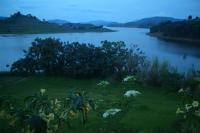 There are 28 islands on the narrow and long fjord-like Lake Bunyonyi. I stayed at the Itambira Island with the Byoona Amagara (Whole Life) Project. It is a non-for-profit initiative whose aim is to improve education and sustainable agriculture around the lake. It offers small portions of land to people who cannot afford to buy their own. The people are free to grow whatever they wish provided they comply with three basic rules - no tree cutting, no slash-burning and no chemical application.
There are 28 islands on the narrow and long fjord-like Lake Bunyonyi. I stayed at the Itambira Island with the Byoona Amagara (Whole Life) Project. It is a non-for-profit initiative whose aim is to improve education and sustainable agriculture around the lake. It offers small portions of land to people who cannot afford to buy their own. The people are free to grow whatever they wish provided they comply with three basic rules - no tree cutting, no slash-burning and no chemical application.
The Byoona Amagara was not fenced and visitors were fully integrated with the local community. In addition, the project welcomed local people to the establishment with no landing fees or any requirement to purchase. So, it was like a community centre and all were welcome. I loved that project!
The island is a perfect spot for relaxing and world-forgetting. It is quiet and apart from reading a book (there is a free library), swimming in the lake or taking a canoe, there is absolutely nothing to do! This was a little disappointing, because one would want some activities when in Africa.
The project director, David, who invited me there, while I was still at the Backpackers Hostel in Kampala, said that they were thinking of organising some activities for the tourist who come to stay at the project but the key priorities would always remain the education and sustainable agriculture.
|
Nov 16, 2005 07:00 PM Visiting Pygmies (Uganda)
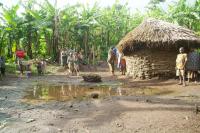 It cost me 40 US dollars to visit the Batwa Pygmies near Kisoro. There was absolutely nothing special about their compounds and the escapades was in deed extremely overpriced. Nevertheless, I was very happy that I went because I supported this exiled community of small people and they threw a great show of singing and dancing, especially for me.
It cost me 40 US dollars to visit the Batwa Pygmies near Kisoro. There was absolutely nothing special about their compounds and the escapades was in deed extremely overpriced. Nevertheless, I was very happy that I went because I supported this exiled community of small people and they threw a great show of singing and dancing, especially for me.
Right in the centre of the group there was a seven-year-old boy who danced incredibly skilfully! I was genuinely impressed. The rhythm and melody of tunes and songs astonished me, too.
The Pygmies call themselves ‘people from the forest’ and to them, their height does not define them. It is the forest that defines them. They occupy central Africa, from Gabon to the eastern corners of Uganda. Nowadays, thry are a subject of harsh discrimination and ridicule. They have a bad reputation of being alcoholics, lazy people and trouble makers. Some of it is unfortunately based on facts. The Pygmies do drink a lot and wander around purposelessly as they do not have jobs.
However, the Pygmies are one of the oldest societies of this world. The first societies of theirs go back sixty thousand years, whereas the majority of other people groups on Earth are merely fourteen thousand years old.
They were known even to the ancient Egyptians, who believed that the Pygmies were the representation of Ra, the Sun god. When I found this piece of information, I could not believe it, because I had never heard about that, not even when I was in Egypt. Well, at least it is consistent with the old age of the Pygmy groups.
Later, the Pygmies were highly regarded by the Tutsi kings, who recognised that the Pygmies were the owners of the forest, and often asked their permission for the coronations as a form of request to co-habit the land. Pygmies often appeared at royal courts, due to their musical and dancing skills. They worked as entertainers.
Today, the situation of the Pygmies is rather dramatic. They were evicted from the forest and forced to live in exile. The problem is that their territorial rights were never legalised, so it is impossible for them to claim anything and they are not legally eligible for compensation.
They do not have any specialist skills and nowadays find it very hard to get jobs. This way they cannot compete with the other ethnic groups in the region and are effectively the most marginalised part of the society, struggling to survive away from home - the forest.
The situation is getting worse with every generation, because they are loosing their knowledge about the forest and how to use its resources for survival. Sadly, this culture is destined for extinction.
|
Nov 15, 2005 07:00 PM Visiting Gorillas in Congo (Zaire, Democratic Republic of Congo)
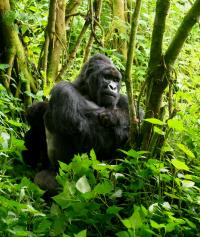 Hidden in the mist and the jungle, the Rugendo Family of mountain gorillas was the objective of the tracking escapade.
Hidden in the mist and the jungle, the Rugendo Family of mountain gorillas was the objective of the tracking escapade.
When I reached the hut/office of the national park (Parc National des Virunga), I met five very friendly park rangers armed with machetes and Israeli machine guns. They were going to do the trek with me (and Jessie and Carrie). So, it was a good proportion: five armed men for three tourists. This should almost make one feel safe.
The day was great. There were frequent sun spells, the air was clear and the views were superb. The first two and half hours of walking were not too hard. Obviously, one should expect from the jungle to make it hard and it was not too easy. The long and thorny plants covering muddy path, logs and roots successfully grabbed ankles and kept untying my boots. Wet bushes, some with stinging leaves and poison ivy were not exactly a joke but the terrain was reasonably flat, so the trek was not excessively strenuous.
Yet when it came to climb a slippery and grassy mountain, already above 2,500 meters over sea level, I started loosing my breath. The bushes and low growing twigs kept catching my shoe laces managing to untie my boots. It was annoying and I stumbled a few times.
It took over an hour to climb the mountain, only to find out that the gorillas were not there. They had been there the day before, and only from that point the guide and the rangers commenced the actual tracking the travelling gorilla family (‘Rugendo’ in the local language means travelling.)
The rangers applied three methods - one: follow gorilla’s brown dung, two: follow gorillas’ footprints (if visible through the bushes) and three: follow broken and half eaten bamboo canes.
After four hours of cutting through the jungle, I was almost losing my hope, but the guide and the rangers kept saying that they were going to find the gorillas, and I should not worry at all. Sure, it was never guaranteed. The apes are wild animals and sighting of wildlife is never guaranteed by any tour operator.
Just when I said to myself ‘where are you, guys?’, Felix suddenly said to me: ‘We are now with the gorillas’. I could not believe it, because I could not see any of them. It was a magical moment.
Well, the rangers collected all my bags and left me off with my camera and my camera bag, filled with batteries and memory cards.
Soon after that I could hear something rummaging through the thick bamboo forest. And then, I saw the father of the family - the giant Silverback.
I found him in the position pictured on the previous page. He was sitting with his 28 month-old son. The dad was just preparing to lay down and relax, and the toddler was playing around and decided to pick daddy's fur.
Both of them were very relaxed and were not disturbed by my presence. This surprised me immensely. I was expecting the daddy gorilla to be more alert and perhaps concerned with the strange visitors. However, Felix told me that the gorillas knew him. He was also making throat noises to tell the gorillas that we were friends. The gorillas were habituated.
Then I went to meet the mom and other younglings. Mommy gorilla was more alert and was watching me closely, particularly as one of the babies approached me and started showing off his acrobatic abilities in a distance of less than two meters and sometimes even closer.
I was obviously briefed before setting out, yet I was not sure what to do exactly in such situation - back off or just stand still.
There were a number of rules regarding the gorillas visits. Both Daniel and the chief officer at the national park office spelled them out quite clearly.
1. A sick person is not allowed to visit (common cold included) - shared DNA means shared diseases.
2. A distance of minimum seven meters must be observed at all times.
3. It is not allowed to touch a gorilla, although a gorilla is allowed to touch a person (often exercised by baby gorillas without warning).
4. Sneezing and coughing must be done with one's back to the gorillas and by covering one's face.
5. In a case of gorilla's attack, running away is strictly and categorically forbidden. Instead it is advised to slowly crouch down and wait for the gorilla to calm down or follow the movement of the guide.
6. Flash photography is strictly forbidden (it is unpopular with ranges and the gorillas).
7. No smoking, no eating, no drinking whilst with the gorillas.
Well, as it turned out, Felix and the rangers (under his command) were not enforcing the rule number 2 and I was allowed to approach the gorillas for a less than a meter. Even the giant Silverback! And when I was so close to him, I felt the r-e-s-p-e-c-t.
It were the baby gorillas, however, who were breaking this rule all the time. They were incredibly curious and playful.
One of them jumped on a branch under which I was taking photographs of the mom gorilla. Then he came down looking straight in my eyes and obviously wanted to play with me and my toy. I stepped back. As I was retreating, he grabbed my arm almost like trying to tell me 'please don't go'.
I did not want him to get any of my germs and frankly I did not want to get any of his. However he still followed me and wanted to play with my camera bag.
Later, two young gorilla guys came as well. They were six and eight years old and began teasing their younger brothers. The toddlers however were difficult players, they showed teeth and jumped down from branches.
As almost the entire family eventually came together, the Silverback dad came by as well and invited all to a snack - the bamboo cane. He sat down and broke a few canes like they were made of papier-mache. Then all joined. They sat down close to their dad and chewed the bamboo. I just kept snapping the photographs hoping my batteries would last and last.
I could not believe how quickly the allowable sixty minutes flew! The last moments I spent watching the Silverback - literally from two meters away. He did not even blink and could not care less about the sound my camera was making with every picture.
The gorillas were fearless. They knew the rangers well, particularly Felix, and felt very relaxed around them. This is why I could come very close - one meter distance and baby gorilla played with me comfortably with absolutely no fear whatsoever.
It felt wonderful that those wild animals were so comfortable with people's presence. They knew it was perfectly safe and that there was absolutely no reason to fear people. Such feeling of the balance and acceptance was overwhelming. I could not believe I was actually experiencing it.
This very close encounter with the extremely endangered mountain gorillas has become one of my most exhilarating experiences of my life. Meeting them and spending time with them was surreal.
The way back from the mountains would have been very easy had it not rained. I mean it did not just rain - it bucketed for two hours and within seconds I was completely soaked. I had water everywhere, even in my very special places.
I was happy with my boots. Only for about half an hour, though! As l had my trousers tucked in my socks (to avoid ants eating me), rain found the gap between my leg and the boot and eventually l was swimming there as well. It was a jolly good day indeed.
I would recommend everyone to go and meet the gorillas and support them and the people who care about them. The rules of the park were good and the guides and rangers knew what they were doing. They did love these animals very much. Felix and the rangers confessed to me that if they had caught a poacher who killed, or attempted to kill, a gorilla, they would execute him on the spot! It might seem harsh, but it Zaire environment it is one of few options.
|
Nov 14, 2005 07:00 PM Kisoro (Uganda)
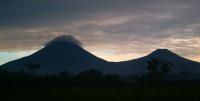 A very small village of Kisoro had nothing interesting to offer apart from the access to three national parks in three countries that covered the area of the forest surrounding the volcanoes' range.
A very small village of Kisoro had nothing interesting to offer apart from the access to three national parks in three countries that covered the area of the forest surrounding the volcanoes' range.
The way to the Congolese (Zaïre) border was spectacularly picturesque allowing the view of five giant volcanoes, two in Rwanda and three in Congo. Often, due to considerable differences in temperature resulting from altitude, the upper parts of the volcanoes' cones were covered in clouds. However the sunsets were awesome and at that time, the cones were clear of clouds. This was one of the most dramatic landscapes of our planet that I had seen until that day. It was truly wonderful.
Soon after I arrived at Kisoro, I had to go to the Uganda/Congo border to complete formalities for the next morning. Apparently, the Ugandan side opened much later than the Congolese one.
Just as the sun was going down, I took a small car to the border, which was less than ten kilometres away. As I was travelling this short distance, ‘Mzungu’ - white man in Swahili and other East African languages - was shouted from the top of young lungs. Arm waving usually accompanied the shouting and occasionally the brats would chase the vehicle. With a closer encounter, 'How are you' always followed 'Mzungu'.
Unfortunately, there was something that annoyed me quite a bit as well. There were two phrases that the kids used: 'Give me my pen' and even worse 'Give me my money'. I tried to forget about how much this bothered me and I kept replying that I did not see their money or their pens. I was glad that my reaction was confusing these kids.
Two American girls, whom I met at the Backpackers in Kampala, Jessica and Carrie, were also crossing to Congo so I took their passports to the border too, without realising that I would need to fill out and sign official immigration forms on their behalf. The guy at the border could not care less that my hand signed three different names. It took less than three minutes to complete the formalities.
The immigration and customs office had no electricity, so I offered my torch light to the officer, so he could actually pretend to be verify the papers.
Gadi, who took me to the border, was a funny twenty-year-old guy, who helped completing some of the behind the scenes activities for the gorillas trekking. It was him who told me that my Concolese guide was late and that he should take me to the border on his behalf. Like with anyone in Africa, you eventually end up discussing family, marriage and children. Gadi was single and had no kids. He actually gladly confessed that he disliked sex. He was the first person on this planet who confessed that he did not like sex. Gadi claimed he had a girlfriend though. How that worked was far beyond my comprehension and even my rather pervy imagination could not work it out. However, I was not sure if I should drill on this subject too much, so I changed it and we spoke about the Pygmies in the area and food.
I learnt that the local indulgence were green grass-hoppers. I thought that these were eaten as appetisers in Thailand and northern Laos only. Well, as it turned out in Kisoro, when the time was right people would emerge on the hills and hunt the grass-hoppers. I understood that every year it was a mass event.
Gadi, as I said, was helping Daniel, the Congolese guide who was taking tourists over the border for the gorillas adventure. I met Daniel later in the evening, who gave a short presentation on what the close encounters with gorillas are like and what Jessica, Carrie and I should expect. It appeared that there were going to be only the three of us.
I forgot where I put my receipt for the gorilla trip. It was already quite late but I was not sure what that would mean, so I phoned the Backpackers Hostel in Kampala. Dorothy there instructed me that since she had a copy I just needed to call Daniel and ask him to get in touch with her. She however could not find his mobile phone number so she gave me the phone number of the owner of the Golden Monkey, where I was staying in Kisoro.
I called him but he would not give me Daniel's phone number and said that he was going to call Gadi, who was going to find Daniel and bring him to me. By that time Daniel was already completely inebriated but did come by and said it was no problem at all.
|
Nov 13, 2005 07:00 PM Jinja (Uganda)
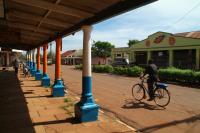 Since my itinerary changed slightly, after booking my gorilla trek for Saturday, I decided to visit the town of Jinja and see the [disputed] source of the world's longest river. I was told several times that Jinja was attractive and I was glad and I made time to go and visit it.
Since my itinerary changed slightly, after booking my gorilla trek for Saturday, I decided to visit the town of Jinja and see the [disputed] source of the world's longest river. I was told several times that Jinja was attractive and I was glad and I made time to go and visit it.
I got a lift from the Backpackers at 6.30 a.m. in a bus with the people going white water rafting. Just before Jinja, I got on a motorbike taxi within three seconds after stepping off the bus. I asked the motorbike guy to take me straight to the source of the Nile. I was glad that things were moving fast that morning. I was preparing myself for having to walk to town, and hey - there it was a bike right at the spot where I was dropped off - almost like it was waiting there for me.
The source of the Nile is an imaginary source as the river is already flowing wide from Lake Victoria. It is rather disappointing. Apparently, in the place that is considered to be the source, the Owen Falls, is underwater as a result of the Owen Falls Dam. How lovely!
Allegedly, there is a point in the river where the water appears to be gushing from the riverbed. One of the locals told me about it and said that I could go and see it (just behind a small island some 500 yards away from where I was standing) by taking a boat.
I went down to the river where the boatsmen were and asked for the price. I got offended by the quote of USD 17 and as energetically as I could, I went away.
I was angry that the boatsman thought I would be so stupid to pay him a fee that amounted to an average month salary for a 10 minute ride on a river covering a distance of under a kilometre!
As I went up on the bank top the other guy asked me what happened. I told him. He then said that this was the way in Africa and one has to bargain. I told him that in response to UGS 30,000 (Uganda shillings) I could only offer UGS 10 as it would be equally unreasonable. He actually chose not to argue with me about that, which indicated that I was right.
I do bargain in Africa only if the starting price is reasonably overstated. This time it was simply unacceptable. The ride was worth not more than 2,000 shillings so I would expect to be asked a starting price of maximum five times as much. Asking for fifteen times over a fair price was taking a piss. And for that I would have only two words - piss off.
I went to Jinja itself which was a great and quiet town with many very good bars. I mean the decor of the venues was so progressive that those places could be just anywhere on the ‘more developed’ part of the planet - Australia, California, Cornwall, Krakow or Berlin. It must be a great town to party, Jinja!
My first thought, however, was that it was rather odd since I was the only white tourist or expat in town. So, who would party there? I mean, who would have money to go out in those places? But I quickly figured out that all tourists must have been white water rafting or gone quad biking, and would have been back by the time it was time to party.
The town’s main street (picture below) was lined with colonial buildings erected mainly by the Eastern Indians, who had come to Uganda to make money. The houses had nice patios, which gave protection from the sun or rain to people walking along the shops, restaurants and bars. It was a great architectural and urbanist idea.
I was quite shocked to see many Hindu temples in Jinja, though. I knew that there was a strong Indian community there, yet somehow it did not cross my mind that many temples would be built in one town. The temples were kept in a good condition and stood up above the one or two storey houses.
When I was wandering about the town, I also found a pretty mosque. Naturally, I took my camera out so I could take a picture of it. As soon as I snapped, a guy appeared in front of me and started asking strange questions why I took the picture. I said because the mosque was very nice - that’s why. Then he told me that they did not allow anyone to take pictures of the mosque. So, it was my turn to ask the question ‘why’. The man could not answer that. By the way, I think the ‘why questions’ are among the hardest to answer.
Anyway, I wanted to be a good and responsible tourist, so I apologised. Nevertheless, I could not resist to comment that I did not know it was forbidden to photograph the mosque. I told him that he better put a sign saying ‘no photography’, for other tourist so they would know that he did not want them to take pictures there.
The only slightly annoying thing about Jinja could be the push-bike and motorbike taxi guys who kept asking if they could take me. And it did not matter where that would be, if only round the corner. I must have said ‘no, thank you’ more than two hundred times. It was somewhat tiring, and it was very hot that day.
At some point, I was asking a shop assistant for directions to the bus station, and I saw one motorbike taxi guy having a go at him later on. The motorbike taxi guy was angry with the shop assistant that he did not recommend me taking a motorbike, which was standing next to us. It was literally just 250 yards to the buses though. I did not get involved in that dispute, and I could not understand the words anyway - only the gestures and body language gave away the subject of their argument.
To go back to Kampala (I had to do that before 3 p.m so I could find a bank and take out some cash, as I could not withdraw cash in any of Jinja's banks) I took a 25 seater commuter bus. It took only 10 minutes to fill and I was on my way in a heartbeat.
In Kampala, city that loves traffic and crowds, I got my cash in Barclays Bank. Then, I went for a walk. I discovered a pretty building of the High Court but due to the heat I decided not to linger too long in the concrete jungle but to proceed towards the hostel. I had no idea where about in the town I was, though. After about two miles I thought l ought to take a motorbike. And you know what? I could not find one for about two miles! I know I must have strayed away from the vaguely identifiable core of the city, but I expected the bikes to be everywhere.
One eventually found me and I agreed the price of one thousand shillings. I had a feeling the lad did not know exactly where to go, though. And he did not. When he learnt how far it was, he asked for more money. I told him that he agreed the destination and price with me already, so it was not right for him to be changing the price but I also told him that I would think about it. At the end, I did not give him what he subsequently wanted but I gave him a bonus.
The next day, I had to get up at 4 o’clock in the morning to catch the bus to the Congolese border. I was told the trip was going to take an entire day, I did not feel very hot about it. Maybe this was because I would never think it would be taking this long. Uganda is not a large country, and I was not supposed to be travelling from one end to another at al.
Anyway, the bus, in which I reserved seats, was average by the African standards. It had five seats per row and it took almost two hours to fill up. En route it became so overcrowded that people had to crouch down or duck every time the bus approached a police checkpoint. It was a long ride, so it must have been quite uncomfortable for many people.
The hardest part of the route was from Kabale to Kisoro. It was a steep dirt track (mud track when wet) in the mountains. In the rainy season, in particular, it could be very dangerous, too. It was narrow and winding with no side (shoulder) barriers, and the precipices were remarkably deep.
However, it was from this track that the views over the Lake Bunyoni and particularly the Virunga volcanoes were awesome. It was seriously breathtaking. Two of the volcanoes are pictured below.
|
Nov 12, 2005 07:00 PM Kampala (Uganda)
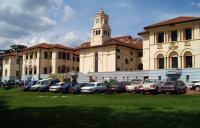 As I arrived in Uganda on a very comfortable and professional Ethiopian Airlines (on a brand new B737-700), I was reminded at the airport that Automatic Teller Machines (ATMs) in Africa are unlikely to give me any money on my cards. At the Entebbe International Airport, I tried three cards and none of them worked.
As I arrived in Uganda on a very comfortable and professional Ethiopian Airlines (on a brand new B737-700), I was reminded at the airport that Automatic Teller Machines (ATMs) in Africa are unlikely to give me any money on my cards. At the Entebbe International Airport, I tried three cards and none of them worked.
I was prepared for such possibility and carried US dollars in cash. So, I changed some money in one of the airport’s bureaux de change. I am not sure why, but I was in quite a good mood that day and did not mind that one of the taxi drivers who hunted me down actually followed me all the way to the bureau de change. One should avoid that in a foreign place, particularly in Africa.
As I made my progress towards Kampala, the taxi driver mentioned all over sudden the current campaigning for the Presidential and Parliamentary elections to be held in March 2006. He said that it had some impact on life in Uganda and I did not fully understand how. He did tell me about the imprisonment of the leader of the opposition to which I gently reacted by saying that it was rather suspicious from an international observer’s point of view.
What he did not tell me, however was that there were serious demonstrations that had happened the day before, which paralysed the capital city and caused the closing of the border with Rwanda. I found about them an hour later from travellers at the Backpackers Hostel. They told me about riots and nerve gas, which the police happily shot at the demonstrators. My understanding was that the situation had been very dangerous, and I should be lucky that I missed all that.
Coming to the Backpackers in Kampala was probably the best thing I did during the entire trip to Africa. As soon as I enquired about tracking the mountain gorillas in Uganda, I found that there were no permits available for months, since the overland trucks booked them all up in bulk. I was also told that gorillas, which normally could be visited in Rwanda, all crossed to Zaire and only there I could try to find them.
My happy day was that the lodge could do all the processing for me. So, I booked myself a trek to see mountain gorillas at the Congolese side of the Virunga Volcanoes' range. As I did that, I could also clear some of the uncertainties off my trip’s calendar. I was in a good mood when I landed and my day just kept turning better and better. It was overall a good day. I managed to make my way across the Lake Malawi in the morning, did I not?
Kampala itself did not impress me much. The only parts of town I liked were the area with the parliament and the one with the High Court. And, yes, I also liked the large Hindu temple by the main bus terminal in the city centre. Other than that, there was nothing there.
The city grew phenomenally fast over the last forty or so years. In 1960, the population of the Uganda’s capital was estimated at about 50,000. Thirty years later it was already 770,000 and in 2002 the census confirmed over 1,200,000 inhabitants.
The majority of the buildings are therefore relatively recent. They have a form of uninspiring concrete boxes, which are spread over a large area. It is rather scary, because it is hard to spot any orientation points, apart from a construction of a large modern temple on one of the city’s hills, perhaps.
|
Nov 11, 2005 07:00 PM Lake Malawi - on the way out (Malawi)
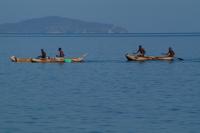 In the morning, Aubry picked me and showed me his lodge, the Chimbe Eagle’s Nest, where I waited for the transport. The lodge was great, although it was designed for travellers with a larger budget. Aubry had great plans to further develop the place, including a large terraced restaurant and bar.
In the morning, Aubry picked me and showed me his lodge, the Chimbe Eagle’s Nest, where I waited for the transport. The lodge was great, although it was designed for travellers with a larger budget. Aubry had great plans to further develop the place, including a large terraced restaurant and bar.
My boat came at 9 a.m. and the quick whisk across the lake was superb.
The boat trip from Cape Maclear to Senga Bay can take as little as 35 minutes if the lake is calm. Normally, it is 45 minutes which compared with the five hour overland journey is a no-brainer. Not only is it significantly faster but first of all is comfortable and the pleasant lake breeze is literally a bliss.
Obviously pleasure like this costs more. The cheapest ride was USD 100 but there were others who could charge more depending on the boat. Anton, for example, asked twice as much and Chimbe Eagle's Nest could do it for USD 150. It might sound much for a lone traveller but for six people it becomes USD 18 a head. Now, one had to make a choice - a breezy, comfortable 45 minutes boat ride or a cramped, bumpy and superhot five hours bus journey.
I was at the airport on time. The mini-international airport of Lilongwe had some great spots to relax. However, to get to those places, I first had to find an immigration officer to stamp my passport out. Upstairs there was a well organised restaurant serving variety of slightly overpriced a la carte dishes and good value chalk board specials. The winner was the shaded terrace with fans!
The other great spot for sitting at the airport was the partially shaded terrace of the waiting lounge bar. It had very comfortable reed chairs and a couch, all with soft cushions.
The security check at the airport was vastly exaggerated. First, there was a metal screening machine and then a person rummaged manually through the entire luggage. The guy confessed to me that the machine was old and no-one could actually read the screen anyway. So, the Malawi taxpayers were screwed by over employment or unjustified cost of overhead (airport electricity bill - the useless machines consumed a lot of power).
|
Page:
 78 79 80 81 82 83 84 85 86 87 88
78 79 80 81 82 83 84 85 86 87 88

|
|
|
